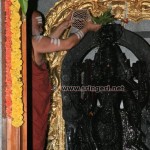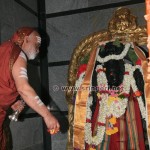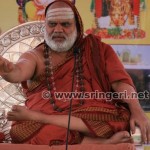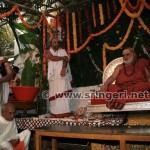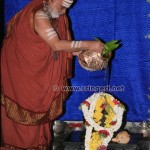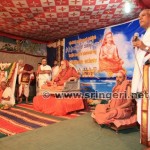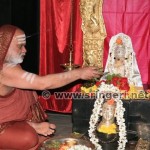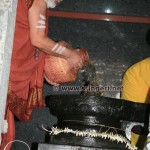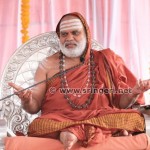Jagadguru in Hassan and Chikmagalur
On the evening of 8th February 2014, Jagadguru Shankaracharya Sri Sri Bharati Tirtha Mahaswamiji started from Sringeri towards Hariharapura of Hassan District and was welcomed at Hariharapura with great reverence by devotees led by Sri H S Subramanya.
It may be noted here that the people of that village completed the construction of the new Sri Kalabhairaveshwara temple 2 years back but with great devotion unanimously decided to wait for the Sringeri Jagadguru to grace the place and perform the Prathishtha Kumbhabhisheka of the temple, though they knew well that the Jagadguru had embarked on a year long Dakshina Bharata.
After the Dhuli Padapuja was performed upon the Jagadguru’s arrival, the Jagadguru Mahaswamiji in His Anugraha Bhashanam said that the Shraddha and Bhakti of the people of the village of Hariharapura had brought Him to the village for the third time. The Jagadguru pointed out to the fact that even Bhagavan Himself had told Devarshi Narada that He would reside where His devotees are present – मद्भक्ताः यत्र गायन्ति तत्र तिष्ठामि नारद । Such was the pure devotion of the residents of the village that the Jagadguru too had to oblige by coming for the Prathishta of the temple.
The Jagadguru also mentioned that Sri Adi Shankara Bhagavatpada did pratishtha of Kalabhairava in the east of Sringeri as the guardian diety. Similar to how Kalabhirava protects Sringeri, there is no doubt that He will protect this village as well
The Jagadguru also remembered that He had performed the Kumbhabhishekas of Prasanna Nanjundeshwara and Goddess Durgamba during His first and second visits to the village. The Jagadguru added that the Chaitanya – Consciousness behind all divinities – Nanjundeshwara, Durgamba and Kalabhairava is one and the same.
Gallery
Kumbhabhisheka to Sri Kalabhairaveshwara
On 9th Feb 2014 morning, the Jagadguru Mahaswamiji performed the Prathishtha Kumbhabhisheka of Sri Kalabhairaveshwara at Chakenahalli (चाकेनहळ्ळि) in Hariharapura village. In the Anugraha Bhashanam delivered after the Kumbhabhisheka, the Jagadguru said one has to maintain equality towards happiness and suffering – उदेति सविता ताम्रः ताम्र एव अस्तमेति च । सम्पत्तौ च विपत्तौ च सताम् एकैव रूपता॥ (the sun is coppery red, when it rises and even when it sets. So too do the wise maintain the same temperament in prosperity and adversity). Then the Jagadguru blessed one and all assembled for the Kumbhabhisheka.
Kumbhabhisheka of Sri Mukkanneshwara
On 10Feb2014 morning Jagadguru performed Kumbhabhisheka of Sri Mukkanneshwara swami and parivara devata at Muthygenahalli (मुत्तिगेनहळ्ळि), birth place of Smt. Channamma Devegowda. The Jagadguru appreciated the reverence that Sri H D Revanna has shown towards his parents. In the Anugraha Bhashanam Jagadguru said, one has to revere one’s mother, father and Guru. The Upanishad itself states – मातृदेवो भव । पितृदेवो भव । आचार्यदेवो भव. The Jagadguru also said that there is not a single place where the Lord does not exist. If you can realize the Lord’s presence everywhere, you need not go to a temple. However, as most do not have such a realization, it is necessary to go to a temple. Some ask, “When the Lord is omnipresent, why constrain Him to a temple?” We are not binding the Lord’s presence to the sanctum of a temple. We only state that the omnipresent Lord is also present in the temple. Can anyone deny that the omnipresent Lord is not in the temple? Of course, you can even worship the Lord where ever you are. But can you focus your mind and worship right here? Hence, in accordance to the spiritual maturity of most people, temples have been consecrated in accordance to the Shastras as places of worship. Prayers offered in such places fructify.
Valedictory of Ananda Sindhu Program
In the evening of Feb 10th, 2014 the Jagadguru Shankaracharya Sri Sri Bharati Tirtha Mahaswamiji reached the Sringeri Shankara Math at Hassan. The Jagadguru Mahaswamiji had the Darshan of Ganapati, Sri Shankarabhagavatpada and Sri Sharadamba then reached the stage decorated for the Guruvandana function. On the occasion of Jagadguru Mahaswamiji’s Yatra to Hassan, the Vedanta Bharati institution of the Yadathore Math organized the Valedictory of Ananda Sindhu program. As part of the program, select Stotras composed by Sri Adi Shankaracharya were chanted by many thousands of devotees across Karnataka in the past months.
In His Anugraha Bhashanam, the Jagadguru stated that the primary motive of the Avatara of Sri Adi Shankaracharya was to spread the message of Dharma and the tenets of Vedanta to the masses.
It was for this very purpose that He penned many works. In His Bhashyas, He strove to explain Vedanta, its subject matter, the means to obtain Tattva Jnana as elucidated in Vedanta, and the nature of Mukti or liberation. Sri Vidyaranya describes the Bhashya of Sri Bhagavatpada thus – विद्वज्जालतपःफलं – the result of the penance of scholars who were eagerly awaiting a proper commentary on the Brahmasutras of Bhagavan Veda Vyasa.
Not stopping with writing the Bhashyas that are filled with abstruse philosophical discussions, Bhagavatpada also wrote Prakarana Granthas to convey the Vedantic tenets in a simple and lucid style. To cater to the needs of all, He composed a number of Stotras or hymns. A Stotra generally refers to the description of the attributes in the worthy – गुणिनिष्ठगुणाभिधानम् स्तोत्रम्. Amongst the Stotras composed by Bhagavatpada, some belong to this category. The second category conveyed the Vedanta Tattva. The Jagadguru pointed out that the Harimeede Stuti, that was part of the Ananda Sindhu program, is one such brilliant example. The third category of Stotras are those that are filled with instructions for common man. For instance, the first verse of the Vishnu Shatpadi Stotra – अविनयम् अपनय विष्णो, दमय मनः, शमय विषयमृगतृष्णाम् , भूतदयां विस्तारय – is not only a prayer to God but also a pointer to the fact that one must remain humble, control the mind and senses, and cultivate empathy towards all beings. The Jagadguru pointed that out that rather than speaking unnecessary words, looking at profane scenes and bringing up unwarranted discussions,everyone must utilize time well and spend it in chanting Stotras.
नमः शिवाय मन्त्रोऽयं वागेषावशवर्तिनी ।
अहो मोहस्य माहात्म्यं नरकं येन पश्यति ॥
(The Lord’s name can be chanted very easily. Yet wonder of wonders! Moha (delusion) is so powerful that people fail to chant the Lord’s name and are going to end up in hell.)
One has to have enough faith in the power of chanting the Stotras and God’s Names. The Jagadguru mentioned that even a single divine name has the power to remove all sins –
एकस्य नाम्नो या शक्तिः पातकानां निवर्तने ।
तन्निवर्त्यमघं कर्तुं नालं लोकाश्चतुर्दश ॥
The Jagadguru then stated the Stotras need not be chanted for securing the praise of anyone, but must be done so with the understanding that daily Parayana brings Shreyas.
The Jagadguru specially blessed Sri Shankara Bharati Swamiji of Yadathore Math who was the driving force of the “Ananda Sindhu” program and ended the Bhashanam blessing everyone who had worked for making the program a successful Dharmic endeavour.
At 6:30 am on 11th February, the Jagadguru Mahaswamiji performed Puja in the Sannidhis of Sri Ganapati, Sri Shankara Bhagavatpada and Sri Sharadamba at the Sringeri Shankara Math, Hassan. Then the Jagadguru gave darshan to all the devotees and blessed them with Phala Mantrakshata and Tirtha Prasada.
Kumbhabhisheka of Mahalingeshwara at Chikmagalur
On the evening of 11th Feb 2014, the Jagadguru Mahaswamiji reached Sringeri Shankara Math, Chikmagalur and was received with great devotion by the assembled devotees. In His Anugraha Bhashanam, the Jagadguru said that Srimad Bhagavad Gita has paramount importance to us as it has been instructed by the Lord Himself –
गीता सुगीता कर्तव्या किमन्यैः शास्त्रविस्तरैः ।
या स्वयं पद्मनाभस्य मुखपद्माद्विनिसृता ।।
Some may have the question – “Was not the Gita meant for Arjuna alone?” Sri Shankara Bhagavatpada writes in His Bhashya on the Gita –
“अर्जुनं निमित्तीकृत्य लोकाय भगवान् भगवद्गीताम् उपदिदेश” –
Having Arjuna as an instrument, the Lord instructed the Bhagavad Gita to all mankind. Hence one must try and follow the Lord’s instructions in the Gita and make life purposeful.
The Jagadguru opined that His primary message was that everyone must be engaged in Svadharma – one’s own Dharma quoting Bhagavan from the Gita:
श्रेयान् स्वधर्मो विगुणः परधर्मात् स्वनुष्ठितात् ।
स्वधर्मे निधनं श्रेयः परधर्मो भयावहः ॥
One must realize that one has to perform the duty prescribed for himself by the Shastras. Indulging in any other duty and performing it even in an excellent fashion is secondary. The second statement says that you will derive benefit if you perform your own duty, even if you give up your life when performing it. The Jagadguru then pointed out many lapses in the present-day society in aspects of Dharma.
For instance, a son’s duty is to take care of his parents when they age. That is his Dharma. However without performing this duty, many send their aged parents to a Vridhhashrama (old age home). They live in a two or three-storied building with their spouse and children and inform the Vriddhashrama that they could go to any extent to meet the finances for taking care of the elderly parents . Is this proper? Is this the gratitude that needs to shown towards the parents, who had nurtured the son, and given him proper education to face all the trials of life?
In schools, teachers are given salary to teach their students. Instead, certain teachers do not teach properly at school and ask their students to come to their house for tuition. If the teacher does this act, is he following his Dharma? No.
People are involved in the activities which is not ordained for them, that is why we see anarchy and disorder. Useless discussions consume time. People assemble for a specific agenda and discuss everything unrelated to that, ultimately yielding no result. There is no mental peace for few are aware of their duties. If each one begins to perform his own duty perfectly, there will be peace everywhere.
These days, some people say our land has to be one where the rule must be “Dharma Nirapeksha Samrajya” – governance without any regard for Dharma. Do these people know what Dharma is? If we were to lead our life without Dharma, then we would no different from animals. Traffic rules apply to humans and not to animals. Not following Dharma would be lead to a complete disintegration of the social and moral fabric of humans. Disciplines in every religion say uphold speaking truth and observing ahimsa as dharma. Hence governance, as well as every citizen always has to take into account universal aspects of Dharma.
The Jagadguru then recounted that Chikmagalur would always remain dear, for immediately after His Sannyasa Sweekara almost 40 years back, the first Kumbhabhishekas that took place were at Shimoga and Chikmagalur. Along with His revered Guru (Jagadguru Sri Abhinava Vidyatirtha Mahaswamiji), He had performed the Kumbhabhisheka at the temples of Lord Ganapati, Sri Sharadamba and Sri Shankara Bhagavatpada in December 1974. The Jagadguru remembered the services of Sri A V Suryanarayana Rao for his services to the Guru, and for his contributions towards the growth of the Chikmagalur Math without any selfish motive. The Jagadguru ended His Anugraha Bhashanam invoking the blessings of God to grant Shraddha towards Dharma for one and all.
On 12th February morning, the Jagadguru Mahaswmiji graced Gavanahalli village near Chikmagalur town, and performed Punah-pratishtha and Kumbhabhisheka of Sri Mahalingeshwara Swami. In the Anugraha Bhashanam, the Jagadguru Mahaswamiji said God is impartial. To say that God does not grace a particular person is foolishness. It is like complaining against a river stating that it does not give you water, while you take no efforts to go near it. Does the river fail to give water to anyone who comes to it? Such is the nature of God, who graces anyone who approaches Him. The Jagadguru Mahaswamiji then blessed everyone. Chikmagalur MLA Sri C T Ravi, who attended the function also received special blessings from the Jagadguru. The Jagadguru returned to Sringeri by evening.

